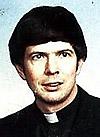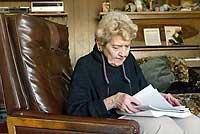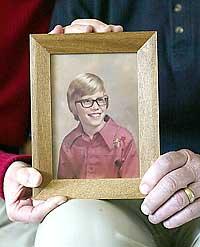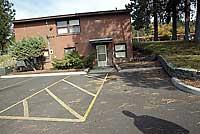By Jonathan Martin and Ken Armstrong
Seattle Times
October 27, 2004
SPOKANE — In the summer of 1974, a young priest with a history of molesting teenage boys was sent to live in a tiny, red-brick rectory with an older priest who was on his way up in the Catholic Church.
The young priest, Patrick Gerald O'Donnell Jr., would be forced from the ministry a decade later, but not before molesting at least 30 boys by his own admission.
The older priest, William S. Skylstad, became bishop of the Spokane diocese and is expected to be elected president of the U.S. Conference of Catholic Bishops next month, giving him one of the church's most powerful voices. The position would place him at the forefront of reform efforts in the clergy sexual-abuse scandal.
 |
| Spokane Bishop William Skylstad says his memory is cloudy about events in the 1970s involving a priest who was molesting children. Photo by Thomas James Hurst |
But another event next month will test Skylstad's credibility as a reformer. Trial is set to begin in the first of five lawsuits accusing O'Donnell of molestation and the Spokane diocese of neglect.
Other links
Timeline: Two priests cross paths in Spokane (PDF)
Seattle: Trial Involving Notorious Abusive Priest Begins
Timeline: Two priests cross paths in Spokane (PDF)
Seattle: Trial Involving Notorious Abusive Priest Begins
In court records, parishioners and victims have portrayed Skylstad as a pastor who failed to supervise his troubled assistant. One parishioner says she warned Skylstad three times about O'Donnell. A former altar boy says he sat in Skylstad's car and told the priest he was molested by O'Donnell. And O'Donnell now admits that he sexually abused several parish boys in the rectory, only an earshot from his pastor's quarters.
Victims and reformers look at Skylstad and ask: Could someone so seemingly blind then have the vision so needed now?
FURTHER READING
Source documents:
During Patrick O'Donnell's last assignment before coming to Assumption parish, O'Donnell's supervising priest writes to a member of the diocese's priest personnel board. The letter refers cryptically to O'Donnell's "problem" and questions his fitness "to function as a priest in a parish." (79K PDF)
Three weeks after writing about Patrick O'Donnell's need for help, his supervisor asks the priest personnel board to move O'Donnell quickly. William Skylstad was a member of the board. O'Donnell was transferred to work with Skylstad at Assumption of the Blessed Virgin Mary parish. (62K PDF)
Spokane Bishop Bernard Topel transferred Patrick O'Donnell to Assumption parish with a request to "obtain the therapy we discussed." (50K PDF)
After an altar boy in Spokane accused Patrick O'Donnell of molestation, the church moved O'Donnell to Seattle for sexual deviancy treatment. The appointment letter from Seattle Archbishop Raymond Hunthausen gives O'Donnell all the "rights and privileges" of an associate pastor. (51K PDF)
Bishop William Skylstad has issued this statement about his recollection of his time with Patrick O'Donnell at Assumption parish. (116K PDF)
Source documents:
During Patrick O'Donnell's last assignment before coming to Assumption parish, O'Donnell's supervising priest writes to a member of the diocese's priest personnel board. The letter refers cryptically to O'Donnell's "problem" and questions his fitness "to function as a priest in a parish." (79K PDF)
Three weeks after writing about Patrick O'Donnell's need for help, his supervisor asks the priest personnel board to move O'Donnell quickly. William Skylstad was a member of the board. O'Donnell was transferred to work with Skylstad at Assumption of the Blessed Virgin Mary parish. (62K PDF)
Spokane Bishop Bernard Topel transferred Patrick O'Donnell to Assumption parish with a request to "obtain the therapy we discussed." (50K PDF)
After an altar boy in Spokane accused Patrick O'Donnell of molestation, the church moved O'Donnell to Seattle for sexual deviancy treatment. The appointment letter from Seattle Archbishop Raymond Hunthausen gives O'Donnell all the "rights and privileges" of an associate pastor. (51K PDF)
Bishop William Skylstad has issued this statement about his recollection of his time with Patrick O'Donnell at Assumption parish. (116K PDF)
Skylstad (pronounced Skill-stad) says his memory is cloudy. "I wish I could recall more clearly conversations and events that happened three decades ago," he said in a written statement. "I am deeply sorry that I cannot."
If elected president, Skylstad would advise the pope and confront such challenges as the church's financial struggles and sagging morale, both traceable to the sexual-abuse scandal.
 |
| Father Patrick Gerald O'Donnell Jr., in a 1978 photo. He has admitted molesting boys. |
Last year, Skylstad wrote to diocese members about what he had learned from the scandal. One lesson, he said, was this: "I also came to understand better that there really is no such thing as a supposed consensual sexual relationship between any adult and a minor."
When the bishops begin meeting Nov. 15 in Washington, D.C., the Survivors Network of those Abused by Priests plans to protest Skylstad's possible elevation to president. "I think it's pretty clear that his record shows he doesn't get it," said David Clohessy, the group's executive director.
A problem-fixer meets a problem
O'Donnell, through his lawyer, declined to be interviewed for this story. Skylstad, through a spokesman, also declined comment. Their accounts are drawn from depositions and, in Skylstad's case, from a written statement regarding his recollection of O'Donnell.
Both grew up in Eastern Washington, and each became a priest. Beyond that, Skylstad and O'Donnell could hardly be more different.
Skylstad, 70, has long played the role of problem-fixer, repairing everything from a cranky boiler to a diocese left reeling from the arrest of its bishop. The oldest of six children, he was born in the Okanogan County town of Omak, delivered on a table in the garage. His father was an apple farmer and Norwegian immigrant. At age 14, Skylstad left home to attend seminary in Ohio. Twelve years later, he was ordained.
His early assignments reflected the church's trust in him. He was principal of a seminary for high-school-age boys near Spokane, evaluating student fitness for the priesthood. He also served on a personnel board that counseled the bishop on problem priests.
In the summer of 1974, Skylstad, then 40, became pastor at Assumption of the Blessed Virgin Mary parish, replacing an aging priest too tired to minister to a neighborhood booming with young families drawn to the newly platted cul-de-sacs on the Spokane River bluff. O'Donnell, then 31, joined him a few weeks later.
O'Donnell was a problem that resisted fixing. The church passed him from parish to parish, from counselor to psychologist to psychiatrist, from victim to victim. The church tried individual therapy, group therapy, hypnotherapy, aversion therapy and prayer. All failed.
O'Donnell grew up in Spokane's elegant South Hill neighborhood. He attended Catholic schools and was an altar boy and an Eagle Scout. He served in Vietnam, and it was there, with bullets ripping through his tent, that he decided to become a priest.
"Seeing lots of death and horror made me hope that I could do something to make this world a little bit better besides just living my own life," he said.
But even then, O'Donnell was troubled by his sexual attraction to teenage boys.
 |
| Rita Flynn, 78, looks through legal documents filed in a lawsuit that accuses Father Patrick O'Donnell of molesting children. She says she warned William Skylstad, now bishop of Spokane, three times about O'Donnell's troubling behavior around teenage boys. Photo by Thomas James Hurst |
In his mid-20s, O'Donnell began attending St. Thomas Seminary in Kenmore. There, a pattern took hold. He molested boys and admitted it to spiritual advisers, he said. He received counseling and continued molesting boys.
While in seminary, O'Donnell says, he was fondled against his will by a priest, Reinard Beaver, who was later forced out of the ministry for sexual misconduct.
Despite a cautionary note from seminary faculty on O'Donnell's "over interest" in youth, the church ordained him in 1971 and gave him assignments that surrounded him with boys: youth minister, coach, Catholic Youth Organization leader, Boy Scout chaplain.
O'Donnell admits molesting several boys during his early assignments. He said he was trying "to be a good leader and a good person most of the time. Then I would kind of fall."
His last assignment before Assumption ended after his supervising priest, Walter Abel, wrote a member of the priest personnel board about O'Donnell's "pediatrician complex" and questioned O'Donnell's ability to function as a parish priest. (A former principal of the parish school said Abel told her O'Donnell was a pedophile.)
Three weeks later, Abel wrote to the personnel board — whose members included Skylstad — saying it was "essential" that the church move O'Donnell quickly.
 |
| On July 29, 1976, Rita Flynn wrote to one of her daughters after learning that Father Patrick O'Donnell had been accused of molesting an altar boy. |
The Spokane bishop, Bernard Topel, transferred O'Donnell to live with Skylstad at Assumption parish. "You should find it a very desirable appointment, considering the people and the pastor," Topel wrote to O'Donnell. "I am asking that you obtain the therapy that we discussed."
But Skylstad said he doesn't recall Abel or Topel warning him about O'Donnell's troubled history, nor does he remember O'Donnell being in therapy while at Assumption parish.
If there was any expectation that Skylstad would keep a close eye on O'Donnell, Skylstad said that was never passed on to him.
A parishioner's warnings
Perhaps more than any other parishioner at Assumption, Rita Flynn warned Skylstad of the dangers his assistant posed.
Flynn raised 11 children in a sprawling rambler a few blocks from the Assumption church. A lifelong Catholic, Flynn, now 78, still goes to daily Mass and prays for a dozen friends and family members.
She once thought the world of Skylstad, who, she said, has an uncanny memory for names, faces, even anniversaries.
In 1975, a year after O'Donnell's arrival, Flynn's sons began telling her unsettling stories. O'Donnell, they said, required schoolboys to line up and sponge their genitals in the school gym, and watched attentively. O'Donnell streaked naked with boys on camping trips. O'Donnell, one son said, "has this thing for young boys."
Flynn took those stories to Skylstad. "Once I told him, I felt I could forget about it," Flynn said. "I had that much trust in him."
 |
| Ann and Terry Corrigan's son Tim committed suicide in 2002 a few hours after telling his wife that Father Patrick O'Donnell had molested him as a boy. "We first grieved for our son Tim, then we came to grieve for the loss of faith in the church we've loved our entire lives," Terry Corrigan says. Photo by Thomas James Hurst |
Skylstad, she said, assured her the misconduct would end. In depositions, Skylstad said he told O'Donnell to stop the "abusive situation," but didn't investigate further, nor did he keep a closer eye on O'Donnell.
In mid-1976, a 16-year-old altar boy told one of Flynn's sons that O'Donnell had molested him — and O'Donnell has admitted to the allegation.
As she had twice before, Flynn said, she immediately called Skylstad, who by now was chancellor and no longer at the parish. She arranged for the boy and priest to talk, Flynn said. The former altar boy, in a deposition, said he met Skylstad at a convenience store, then disclosed the abuse during a half-hour talk in Skylstad's car.
Flynn, anguished, wrote one of her daughters: "Father Pat has struck again."
The diocese, Flynn said, did not remove O'Donnell immediately after the boy came forward, so her husband forced the issue. He told Skylstad's successor: Do something about O'Donnell, or I'll tell the whole parish.
Soon after, Flynn said, the church sent O'Donnell to Seattle for treatment.
What now angers Flynn is Skylstad's foggy memory of events she remembers so well. Skylstad has said he doesn't remember meeting with the abused altar boy, nor does he remember Flynn's complaint about the streaking.
"I realized [Skylstad] was not operating as a good person," she said earlier this month. "He is so much a company man that he's willing to deny reality."
Flynn quit tithing earlier this year for the first time in her life. "I love the Lord," she said, "but I don't like the church."
Two years of preying on boys
Rita Flynn didn't know it, but the altar boy was hardly alone.
O'Donnell has admitted molesting at least 11 boys while at Assumption, while denying the claims of eight others who say he abused them during that time.
 |
| A photo of Tim Corrigan at age 11 |
By his admissions, O'Donnell victimized more boys while at Assumption than during any other period in his 15-year ministry.
O'Donnell won parents' trust by lavishing attention on their sons, court records and interviews show. He took boys for rides in his Jeep, for cruises on his 21-foot boat, and on camping trips in the mountains. He took boys to movies and McDonald's. He was a willing babysitter.
At a nearby pool, he offered quarters to boys to dive in naked. Losers in dice games had to disrobe. When alone with boys, he often reached down their shorts.
O'Donnell has admitted to molesting at least three children while in the rectory itself.
Skylstad lived on the second floor, O'Donnell below. Several men remember Skylstad coming down from his apartment and heralding his advance with, "It is just me, little old me."
Skylstad said he doesn't remember O'Donnell taking kids on trips or owning a boat. But he does recall boys passing through the rectory.
Children "flocked around" O'Donnell, Skylstad said. Parents liked him too.
"They were starved for someone who would take an interest in the kids," he said.
One's rise, the other's fall
In 1977, a year after leaving Assumption, Skylstad became bishop of the Yakima diocese.
While there, he dealt with at least three priests accused of sexually abusing minors. In one case, he told the priest to get outpatient counseling but allowed him to remain in his parish. A residential program would have been "really very expensive," Skylstad said.
In 1989, the church asked Skylstad to repair damage done by Spokane Bishop Lawrence Welsh, who had been arrested for drunken driving. When Welsh left for alcohol treatment, Skylstad administered the diocese. In 1990, the church named him the Spokane bishop.
Skylstad continued to rise, and in 2001, was elected vice president of the U.S. Conference of Catholic Bishops, a customary steppingstone to the presidency. He has since met with the pope several times.
"He's not a grandstander. He's a team player. That's the kind of person the bishops like as president, not someone who will go off on tangents or say stupid things," said Thomas Reese, editor of the Catholic magazine America.
O'Donnell, after leaving Assumption, continued to molest boys. In 1976, when the church sent him to Seattle for treatment, he moved into the St. Paul parish in Rainier Beach, the school playground outside his door. The church allowed him to stay in ministry while getting a doctorate in psychology.
But he molested boys while in treatment in Seattle, and after returning in 1978 to the Spokane diocese.
In 1986, a newspaper story led to his downfall. A Spokane reporter asked the diocese for an expert on sexual abuse by priests, and was directed to O'Donnell.
"I don't think the local church has a problem with that [pedophilia] at this point," O'Donnell was quoted as saying.
Rita Flynn read the quote and was so outraged she sent the reporter a packet on O'Donnell. An ensuing story forced the diocese to remove O'Donnell from ministry, although he remained a priest.
He moved to Bellevue and opened a psychology practice. This year, he surrendered his license after a man reported that O'Donnell had molested him at Assumption.
 |
| When this photo was taken, Tim Corrigan is thought to have been about 30. He was 39 when he committed suicide. |
The Spokane diocese is moving to defrock him — an extraordinary step that requires Vatican approval.
O'Donnell, 62, now works in the Puget Sound area as an auditor in a casino.
The toll
On Aug. 29, 2002, Tim Corrigan was finishing breakfast at his home three blocks from the Assumption church when he saw O'Donnell's face grinning at him from the local paper. "Read it," he told his wife, Cheryl, pointing to the article.
Men had recently begun disclosing abuse by O'Donnell. Cheryl Corrigan had long suspected Tim, a parish student during O'Donnell's tenure, had also been molested. "Tim, did Father Pat touch your privates?" she asked.
Cheryl Corrigan had asked her husband before, and been told no. This time, Tim said yes. Then he hugged and kissed his wife of 16 years and left for work.
Around noon, Corrigan, a 39-year-old father of three, lay down across railroad tracks. His suicide note said: "It is nobody's fault."
That night, two of Tim's friends grieved with Cheryl. She said both shared a secret: They, too, had been molested by O'Donnell, and they had seen O'Donnell molest Tim.
The toll from O'Donnell's abuse reaches beyond the Corrigans. Another man mentioned O'Donnell by name in a suicide note before killing himself in 1990. Other victims say they have suffered alcoholism, sexual dysfunction, isolation and chronic depression.
The church, in court records, has said it knows of 50 cases in which O'Donnell is accused of molesting, grooming or exposing himself to boys. Although O'Donnell admits molesting so many boys he can't remember all their names, he denies abusing Corrigan.
It took Tim Corrigan's brother, Mike, several days to tell his parents the reason for Tim's suicide. Ann and Terry Corrigan bought their house in 1962 because it abutted church property, and Terry served on church boards for four decades.
"If you ever did an autopsy on us, you'd find Catholic in our bones," Terry Corrigan said. As for Skylstad, "We thought he was a prince of a fellow, a holy man."
 |
| Terry Corrigan's shadow falls near the rectory that William Skylstad and Patrick O'Donnell shared in the 1970s. The rectory's back door used to lead from O'Donnell's bedroom to a school playground. Photo by Thomas James Hurst |
Unanswered questions have eroded their faith. Why doesn't Skylstad remember Rita Flynn warning him? Why didn't he, or other church officials, call police? Why didn't Skylstad and previous Spokane bishops stop O'Donnell?
"We first grieved for our son Tim, then we came to grieve for the loss of faith in the church we've loved our entire lives," Terry Corrigan said. "Some day I may be able to forgive O'Donnell. But I don't know if I can ever forgive those involved in the cover-up."
A return to Assumption
A month after Tim Corrigan's death, Skylstad returned to Assumption to answer for the damage his old housemate had caused.
At a special nighttime meeting — part of a series of visits to parishes harmed by abusive priests — Skylstad apologized on behalf of the church, then touted a new clergy-abuse policy from the bishops' conference. His own diocese, he said, went further, banning priests from taking children on vacations or to their rooms.
But parishioners weren't in the mood for policy, according to a videotape of the meeting.
"I've been a parishioner at Assumption all my life, and I have to say, from the depths of my heart, that it truly sickens me, this thing that took place here," Bob Moore told the bishop. "Did you do everything in your power, when you found out about this wrong, to try and correct it and to protect the kids who were so harmed by the actions of this man?"
Skylstad nodded, thanked Moore, and returned to policy. "So much of the ministry of the church deals with young people, and we have to make sure that ministry takes place in a safe environment, as safe as we can make it," Skylstad said. "It's just got to be."
In the back of the church, a woman whispered: "Where's the answer?"
A learning curve
The answers would come in depositions earlier this year, under questioning from lawyers representing about two dozen of O'Donnell's alleged victims.
Skylstad said that when he learned of the altar boy's complaint, he didn't alert parishioners or police. He didn't question other boys seen in the rectory with O'Donnell. He didn't take any steps to determine if there might be other victims. "That would have been an almost impossible thing to do," he said.
Decades ago, mental-health professionals advised the church that sexual deviancy was curable and that treatment should be sought, Skylstad and abuse experts say.
What may appear as clear warning signs now, weren't then, Skylstad said: "It's very easy to take a revisionist approach to this whole thing."
At one time state law required clergy to report molestation complaints to police, but they were exempted from the law in 1975.
They are still exempt, but whether the law requires it or not, Skylstad supports notifying police.
He also has gone further than some bishops to be open about the sexual-abuse scandal. The Spokane diocese initially asked that certain records in sexual-abuse lawsuits be kept from the public, but, unlike the Seattle archdiocese, withdrew that request after local media objected.
Last year, Skylstad wrote a message to "unnamed victims of sexual abuse," saying: "I need and want to continue to seek ways to apologize to you. I will continue to seek to do penance and provide for reconciliation."
O'Donnell also has expressed remorse. In July, under questioning by an attorney who represents Corrigan's widow, he said, "I just wanted to say that I'm very, very sorry for any damage I ever caused anybody. ... I'm very, very sorry for that. I'm sorry."
Skylstad has met with some victims of sexual abuse, but not others, citing pending lawsuits.
He also has reached out to some of the abusers. More than a quarter-century after they lived together in that tiny red-brick rectory, Skylstad and O'Donnell have talked on the telephone.
"I simply offered an expression of prayers to him," Skylstad said, "and he in turn for me."
Jonathan Martin: 206-464-2605 or jmartin@seattletimes.com
Ken Armstrong: 206-464-3730 or karmstrong@seattletimes.com
Any original material on these pages is copyright © BishopAccountability.org 2004. Reproduce freely with attribution.